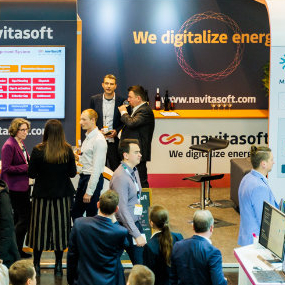
Combining modern approaches to management with niche market expertise, Navitasoft has designed IT systems for international markets from Switzerland to Ukraine to Estonia. Its wide product range is the main reason why the energy IT company stands out from the competition.
Before starting his own business, Ákos Füzi worked for several large organizations. His career began at Richter, an innovation-driven specialty pharmaceutical company; then, as head of Medimpex Trading House, he represented Hungarian pharmaceutical firms in Japan for four years. It was in 2005, around the time energy markets were becoming liberalized, that he started working in energy informatics, at the then leading industrial IT developer in Hungary.
“It was obvious that, even in the energy sector, fundamental business processes would be based on IT systems that - once they were available - would have to adapt to regulations that varied from country to country. While working in the Far East, I learned that specializing in such niche markets held real promise. In our first major project, we had to provide third party access to a natural gas system. Inspired by that venture, I set up my own company called IP Systems in 2008, which would later become Navitasoft,” the founder tells us.
Specializing in energy IT, the company did not even have to advertise for the first two years. Clients, mostly gas market traders, kept coming despite the global economic crisis. While a lot of firms in the industry were struggling, business was going great for IP Systems. Just 18 months after it was established, the company already had an energy trading platform that could simultaneously manage both electricity and natural gas trading portfolios.
Füzi decided to break away from the typical Hungarian management style and introduced Japanese managerial culture instead. One of the first companies in Hungary to use scrum methodology, Navitasoft is organized into cross-functional task groups that typically consist of four software developers, a business analyst, and a tester - with professionals from different fields working together at all stages. Corporate goals are achieved along the lines of the commitments made by these groups.
Every morning, there are “stand-up” meetings at every level and in every area where front line employees and managers discuss within their respective groups what tasks they completed the previous day and what they will be working on during that day. Even while everyone worked from home and meetings were held online due to the pandemic, this method helped ensure that the implementation and monitoring of the projects was effective and uninterrupted.
The company’s organizational culture and methodology have proven hugely successful. In spite of the fierce competition for new talent in the IT sector, Navitasoft has managed to build a very strong team over the years. The company now employs around 60 IT professionals. In addition to the one in Budapest, it has set up an office in Subotica, Serbia. However, by their very nature, most IT jobs also lend themselves to remote work.
In 2011, it became clear that the company could hold its own in Western Europe too: it received its first order from a Swiss firm, which was soon followed by orders placed by other Western European organizations. It was evident that Navitasoft could keep up with Western European IT companies, both in terms of expertise and software technology. Today, its software is also essential for key business processes of large energy companies in Estonia, Latvia, Ukraine and Croatia. Navitasoft shoulders a huge responsibility: a mistake could potentially lead to failures in a country’s electricity or natural gas billing systems.
Despite the occasional lows, such as having to downsize by nearly 50% due to the collapse of a large foreign project in 2017, Navitasoft has generally managed to maintain steady growth over the years. It is a unique characteristic of the energy IT sector that companies not only compete against but also collaborate with the competition. Navitasoft’s biggest such project to date was to build the central IT system for Ukrenergo, the system operator of the Ukrainian electricity market. It was a considerable challenge since the Ukrainian energy market is ten times larger than the Hungarian one, and many Western European companies are reluctant to carry out projects in the country. Navitasoft was the head of the consortium in charge of the $8 million-plus project, responsible for IT implementation and development, and supported by Siemens Austria, among others.
According to Füzi, one of Navitasoft’s main advantages is that, in addition to custom development, it also offers a large product portfolio for its customers to choose from. Its turnkey solutions can be divided into three categories: solutions for system operators, traders, and stakeholders in energy market communication. In one of its most successful years, the company added three new products to its portfolio. For a time, however, the founder achieved success elsewhere, too: in 2013, Egis Zrt. entrusted him with the task of establishing a subsidiary in Shanghai, which he subsequently led until 2017. "Those four years gave me the opportunity to let go of the culture of one-person leadership," he says.
Although the pandemic has made it challenging to recruit new staff and gain new customers, it has had some benefits too, such as the increasing acceptance of cloud technologies. As more and more companies shift to internet-based systems, business leaders are becoming more open to online and cloud-based solutions. And Füzi points out another bonus: meetings are now a lot more efficient.
What makes the future of the energy sector so exciting is that new trends and developments occur constantly. For instance, due to the growing number of solar panels, many small producers, most of whom are also energy consumers, are entering the market. As measuring and controlling devices that are directly connected to the internet become increasingly widespread, players in energy markets will have to manage more and more data.
Navitasoft very much looks forward to this new data-driven era within the energy industry, and does not rule out the possibility of going public one day.
Adapted from the original article in Hungarian published by the Budapest Stock Exchange.




